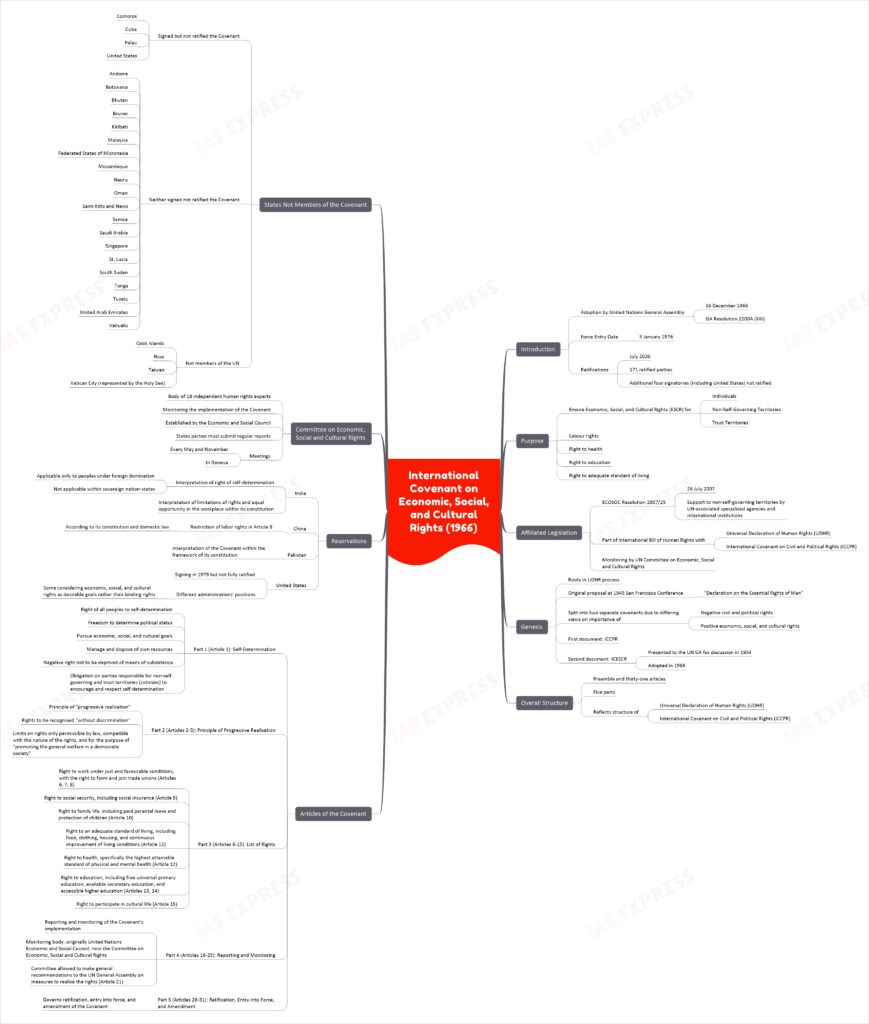International Covenant on Economic, Social, and Cultural Rights (1966)
Introduction
- Multilateral treaty adopted by the United Nations General Assembly (GA) on 16 December 1966 via GA. Resolution 2200A (XXI)
- Entered into force on 3 January 1976
- As of July 2020, 171 parties have ratified the Covenant with an additional four signatories including the United States not ratifying
Purpose
- Commitment to ensure economic, social, and cultural rights (ESCR) for individuals and Non-Self-Governing and Trust Territories
- Labour rights
- Right to health
- Right to education
- Right to an adequate standard of living
Affiliated Legislation
- ECOSOC Resolution 2007/25 (26 July 2007): Support to non-self-governing territories by UN-associated specialized agencies and international institutions
- Forms part of the International Bill of Human Rights with:
- Monitored by the UN Committee on Economic, Social and Cultural Rights
Genesis
- Rooted in the process leading to the UDHR, with original proposal for a “Declaration on the Essential Rights of Man” at the 1945 San Francisco Conference
- Ultimately split into two separate covenants due to differing views on importance of negative civil and political rights versus positive economic, social, and cultural rights
- First document became the ICCPR, second became the ICESCR, both presented to the UN GA for discussion in 1954 and adopted in 1966
Overall Structure
- Preamble and thirty-one articles, divided into five parts, reflecting the structure of the Universal Declaration of Human Rights (UDHR) and the International Covenant on Civil and Political Rights (ICCPR)
Articles of the Covenant
Part 1 (Article 1): Self-Determination
- Recognition of the right of all peoples to self-determination
- Right to freely determine political status
- Pursue economic, social, and cultural goals
- Manage and dispose of own resources
- Affirms a negative right not to be deprived of means of subsistence
- Obligation on parties responsible for non-self governing and trust territories (colonies) to encourage and respect self-determination
- Recognition of the right of all peoples to self-determination
Part 2 (Articles 2-5): Principle of Progressive Realisation
- Establishes principle of “progressive realisation”
- Mandates rights to be recognised “without discrimination” based on various factors including race, sex, language, religion, political opinion, national or social origin, property, birth or other status
- Limits on rights only permissible by law, compatible with the nature of the rights, and for the purpose of “promoting the general welfare in a democratic society”
Part 3 (Articles 6-15): List of Rights
- Lists the rights themselves, including but not limited to:
- Right to work under just and favourable conditions, with the right to form and join trade unions (Articles 6, 7, 8)
- Right to social security, including social insurance (Article 9)
- Right to family life, including paid parental leave and protection of children (Article 10)
- Right to an adequate standard of living, including food, clothing, housing, and continuous improvement of living conditions (Article 11)
- Right to health, specifically the highest attainable standard of physical and mental health (Article 12)
- Right to education, including free universal primary education, available secondary education, and accessible higher education (Articles 13, 14)
- Right to participate in cultural life (Article 15)
- Some rights require specific actions to be realised as they are positive rights requiring active fulfilment
- Lists the rights themselves, including but not limited to:
Part 4 (Articles 16-25): Reporting and Monitoring
- Governs reporting and monitoring of the Covenant’s implementation
- Monitoring body – originally United Nations Economic and Social Council, now the Committee on Economic, Social and Cultural Rights – allowed to make general recommendations to the UN General Assembly on measures to realise the rights (Article 21)
Part 5 (Articles 26-31): Ratification, Entry into Force, and Amendment
- Governs ratification, entry into force, and amendment of the Covenant
Reservations
- India: Interprets the right of self-determination as applicable only to peoples under foreign domination, not within sovereign nation-states. Interprets limitations of rights and equal opportunity in the workplace within its constitution.
- China: Restricts labor rights in Article 8 according to its constitution and domestic law.
- Pakistan: Interprets the Covenant within the framework of its constitution.
- United States: Although signed in 1979, the Covenant has not been fully ratified by the United States. Different administrations have taken various positions on the matter, with some considering economic, social, and cultural rights as desirable goals rather than binding rights.
Committee on Economic, Social and Cultural Rights
- The Committee on Economic, Social and Cultural Rights is a body of 18 independent human rights experts responsible for monitoring the implementation of the Covenant.
- Established by the Economic and Social Council after the failure of previous monitoring bodies.
- States parties must submit regular reports to the Committee on measures taken to implement Covenant rights.
- Committee meets every May and November in Geneva.
States Not Members of the Covenant
- Signed but not ratified the Covenant
- Comoros, Cuba, Palau, and the United States have signed but not ratified the Covenant.
- Neither signed nor ratified the Covenant
- Andorra, Botswana, Bhutan, Brunei, Kiribati, Malaysia, Federated States of Micronesia, Mozambique, Nauru, Oman, Saint Kitts and Nevis, Samoa, Saudi Arabia, Singapore, St. Lucia, South Sudan, Tonga, Tuvalu, United Arab Emirates, and Vanuatu
- Not members of the UN
- Cook Islands, Niue, Taiwan (not a UN member), and Vatican City (represented by the Holy See)


